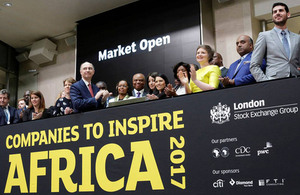Priti Patel urges City of London to become global financial centre for developing countries
International Development Secretary Priti Patel announced a new partnership to generate business investment in developing countries.

Priti Patel opens the London Stock Exchange. Picture: LSE
International Development Secretary Priti Patel today opened the London Stock Exchange and announced a new partnership which will help generate much needed business investment in developing countries to help them stand on their own two feet.
Speaking at the launch of the London Stock Exchange’s (LSE) first-ever ‘Companies to Inspire Africa’ report, Ms Patel urged the City of London to rise to the challenge of becoming the global financial centre for the developing world.
Ms Patel set out that the LSE is leading the way through a new partnership with the organisation GuarantCo – supported by DFID – which will bring more international bonds in a wider range of currencies to the London market.
This will mean businesses can invest in vital infrastructure projects in developing countries, helping them defeat poverty with sustained economic growth. The partnership should also lead to more businesses from Africa and South Asia being able to borrow in London, in the currency that suits them best.
Ms Priti Patel has been clear that no country can defeat grinding poverty without sustained economic growth – jobs and investment opportunities are vital to helping the world’s poorest people stand on their own two feet.
The LSE’s Companies to Inspire Africa report identifies the fastest-growing and most dynamic private businesses across Africa to help generate investment opportunities for UK companies.
Speaking at the LSE Ms Patel said:
The London Stock Exchange’s first-ever ‘Companies to Inspire Africa’ report is proof of the dynamism and vision of the City of London in supporting Africa’s growing economies.
Now is the time for UK businesses to seize the opportunities offered by Africa, and the UK Government is supporting the City of London to become the global financial centre for the developing world.
This will help Africa industrialise faster, trade more and create millions of jobs, driving the continent forward to a future of prosperity, and helping some of the world’s poorest countries stand on their own two feet.
The African continent forms one of the most significant opportunities to not only create jobs, build livelihoods and help some of the world’s poorest people, but also produce trading opportunities for British businesses and create our trading partners of the future.
Without those jobs a whole generation will be consigned to a future where opportunities are always out of reach, potentially fuelling instability and mass migration with direct consequences for countries like Britain.
The additional financing needed to achieve the UN Global Goals by 2030 is estimated at $2.5 trillion every year, but current investment levels are less than half of that.
DFID’s first Economic Development Strategy, launched by Ms Patel earlier this year, sets out how private sector investment will help developing nations speed up their rate of economic growth, trade more and industrialise faster, and ultimately lift themselves out of poverty.
City firms including Standard Chartered, Aviva, Prudential, Lloyds of London, and the London Stock Exchange have already made public statements about supporting and rising to the challenge set by Ms Patel to drive more private sector investment into the world’s poorest countries.
Notes to editors
GuarantCo is majority-funded by the Department for International Development, and provide guarantees for local currency lending in developing countries. By reducing the risks this helps to mobilise private sector capital for financing infrastructure projects in local currency without the fear that currency fluctuations could render them bankrupt.
General media queries (24 hours)
Email mediateam@dfid.gov.uk
Telephone 020 7023 0600
If you have an urgent media query, please email the DFID Media Team on mediateam@dfid.gov.uk in the first instance and we will respond as soon as possible.